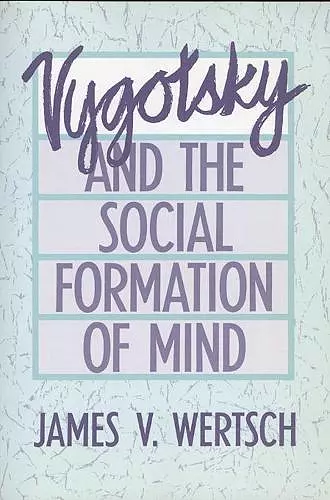Vygotsky and the Social Formation of Mind
Exploring Vygotskian Theory in Modern Research
Format:Paperback
Publisher:Harvard University Press
Published:14th Nov '88
Currently unavailable, and unfortunately no date known when it will be back

This book presents a detailed analysis of Vygotsky's ideas and their relevance today, offering insights for research in the social sciences and humanities.
In Vygotsky and the Social Formation of Mind, James Wertsch offers a comprehensive synthesis and critique of Vygotsky's major ideas, presenting a program for applying Vygotskian theory to contemporary research in the social sciences and humanities. Drawing extensively on Vygotsky's works in both Russian and English, as well as his own studies in the Soviet Union, Wertsch provides a rich exploration of how these ideas can inform current academic discourse.
Wertsch delves into three central themes that are pivotal in Vygotsky’s work: the importance of genetic or developmental analysis, the social origins of higher mental functioning, and the role of tools and signs in human psychological activity. He emphasizes the concept of semiotic mediation as crucial for understanding Vygotsky’s contributions to the study of human consciousness, thus allowing readers to appreciate the depth of Vygotsky’s insights.
In the final chapters, Wertsch extends Vygotsky’s claims by integrating findings from various disciplines such as linguistics, semiotics, and literary theory. This focus on semiotic phenomena, particularly human language, illustrates how Vygotsky’s approach can connect disparate strands of human science, offering a principled framework that remains relevant in today's academic landscape. Vygotsky and the Social Formation of Mind serves as a vital resource for scholars seeking to navigate the complexities of Vygotsky’s theories in contemporary contexts.
This book falls into three parts: a biographical sketch of Vygotsky, an outline of his principal tenets, and Wertsch’s own attempt to bring them up to date. His scholarship is exemplary: the book is the most detailed account in English of its subject’s life and work. It will be welcomed by cognitive psychologists and students of development. -- P. N. Johnson-Laird * Times Literary Supplement *
Clear, subtle, and always focused on the central issues… The book goes beyond Vygotsky’s work and draws on other current research in cognitive studies, cross-cultural psychology, education, and work by linguists, philosophers, and students and colleagues of Vygotsky… It is a significant contribution by Wertsch to have synthesized the theory itself with such clarity, and more so to have brought it up to date with contemporary research on so many fields. -- Thomas S. Weisner * American Anthropologist *
An excellent analysis of Vygotsky’s theory and it will certainly be enjoyed by those interested in the history and theory of psychology. But it also should be of great interest for those involved in the experimental study of language and cognition. -- Alex Kozulin * American Journal of Psychology *
Wertsch accomplishes an impressive task in this book, providing an enriching source on Vygotsky’s ideas as well as constructively criticizing and extending them. * Contemporary Psychology *
Wertsch presents the reader with what amounts to a sort of intellectual history of an individual of remarkable breadth and insight and, in doing so, has revealed himself to be a first-rate scholar as well. -- James Gavelek * Journal of Reading Behavior *
This lucid account of Vygotsky’s ideas makes clear why he is exerting such a great influence on contemporary psychology and education. Especially valuable is Wertsch’s explanation of the links that existed in Vygotsky’s work between the social and humane sciences in the work of Bakhtin, the Formalists, the Prague School, and many others. Reading the book is a terrific educational experience. -- Michael Coles
I am full of admiration for this book. Vygotsky is an immensely attractive figure who has real conceptual help to offer those now struggling to integrate the immediacy of social and historical experience with the rigor and system of theory. James Wertsch has intimate experience of the Soviet Union, including teaching stints in the psychology faculty at Moscow State University, and shared research with the Soviet scientists most creatively working out new implications of the Vygotsky legacy. His account of Vygotsky’s thought is as authoritative as can be found in any language, including Russian; but this book is not canonical: it is much more than an accurate account of Vygotsky’s work in the ’20s and ’30s, exciting as that work was and as skillfully as Wertsch has rendered it. At least half of this book is a dialogic encounter between Vygotsky and the most recent work in linguistics, psychology, and cognitive science—a tour de force of synthetic imagination in which Wertsch himself emerges as an important theorist. -- Michael Holquist
Wertsch’s book admirably meets the need of presenting the contemporary significance of Vygotsky’s views… He is skilled in peeling apart complex ideas and clearly expressing their core meanings and implications… A much-needed model of how cognitive scientists today can work creatively within a grand theoretical framework that places the study of the individual within the study of humanity as a whole. -- Sylvia Scribner
Wertsch’s book is an important piece of scholarship, drawing on the one side from Vygotsky’s theoretical brilliance and on the other from Wertsch’s unusual gifts as a scholar. -- Sheldon H. White
ISBN: 9780674943513
Dimensions: 235mm x 156mm x 15mm
Weight: 408g
280 pages